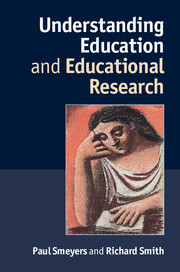Book contents
- Frontmatter
- Contents
- Acknowledgements
- Introduction
- 1 Education and its research
- 2 The nature of social science
- 3 The idea of method
- 4 The nature of philosophy
- 5 The art of research
- 6 Language, truth and meaning
- 7 On the dominant nature of educational research and its shortcomings
- 8 Research, policy and practical reasoning
- 9 The limits of measurement
- 10 Parenting and government intervention in the family (case study I)
- 11 Researching happiness and well-being (case study II)
- 12 Philosophy and research
- Notes
- References
- Index
11 - Researching happiness and well-being (case study II)
Published online by Cambridge University Press: 05 November 2014
- Frontmatter
- Contents
- Acknowledgements
- Introduction
- 1 Education and its research
- 2 The nature of social science
- 3 The idea of method
- 4 The nature of philosophy
- 5 The art of research
- 6 Language, truth and meaning
- 7 On the dominant nature of educational research and its shortcomings
- 8 Research, policy and practical reasoning
- 9 The limits of measurement
- 10 Parenting and government intervention in the family (case study I)
- 11 Researching happiness and well-being (case study II)
- 12 Philosophy and research
- Notes
- References
- Index
Summary
The ways of happiness and meaning are not the same. To find happiness, a man need only live in the moment; he need only live for the moment. But if he wants meaning – the meaning of his dreams, his secrets, his life – a man must reinhabit his past, however dark, and live for the future, however uncertain. Thus nature dangles happiness and meaning before us all, insisting only that we choose between them.
(Rubenfeld, 2007: 5)What the Americans, in their constitution, call ‘the right to the pursuit of happiness’ (please note, not ‘the right to happiness’), is the right to swim upstream, salmon-wise.
Pursuing happiness, as I did, and I still do, is not at all the same as being happy – which I think is fleeting, dependent on circumstances, and a bit bovine.
If the sun is shining, stand in it – yes, yes, yes. Happy times are great, but happy times pass – they have to – because time passes.
The pursuit of happiness is more elusive; it is life-long, and it is not goal-centred.
What you are pursuing is meaning – a meaningful life. There’s the hap – the fate, the draw that it yours, and it isn’t fixed, but changing the course of the stream, or dealing new cards, whatever metaphor you want to use – that’s going to take a lot of energy. There are times when it will go so wrong that you will barely be alive, and times when you realise that being barely alive, on your own terms, is better than living a bloated half-life on someone else’s terms.
(Winterson, 2012: 24–25)- Type
- Chapter
- Information
- Understanding Education and Educational Research , pp. 172 - 187Publisher: Cambridge University PressPrint publication year: 2014



